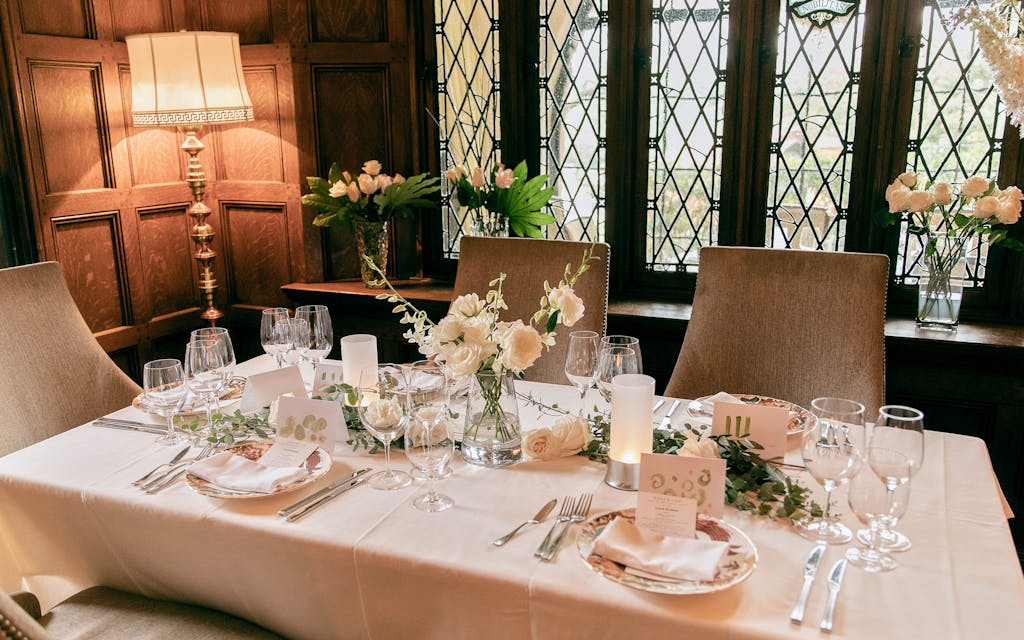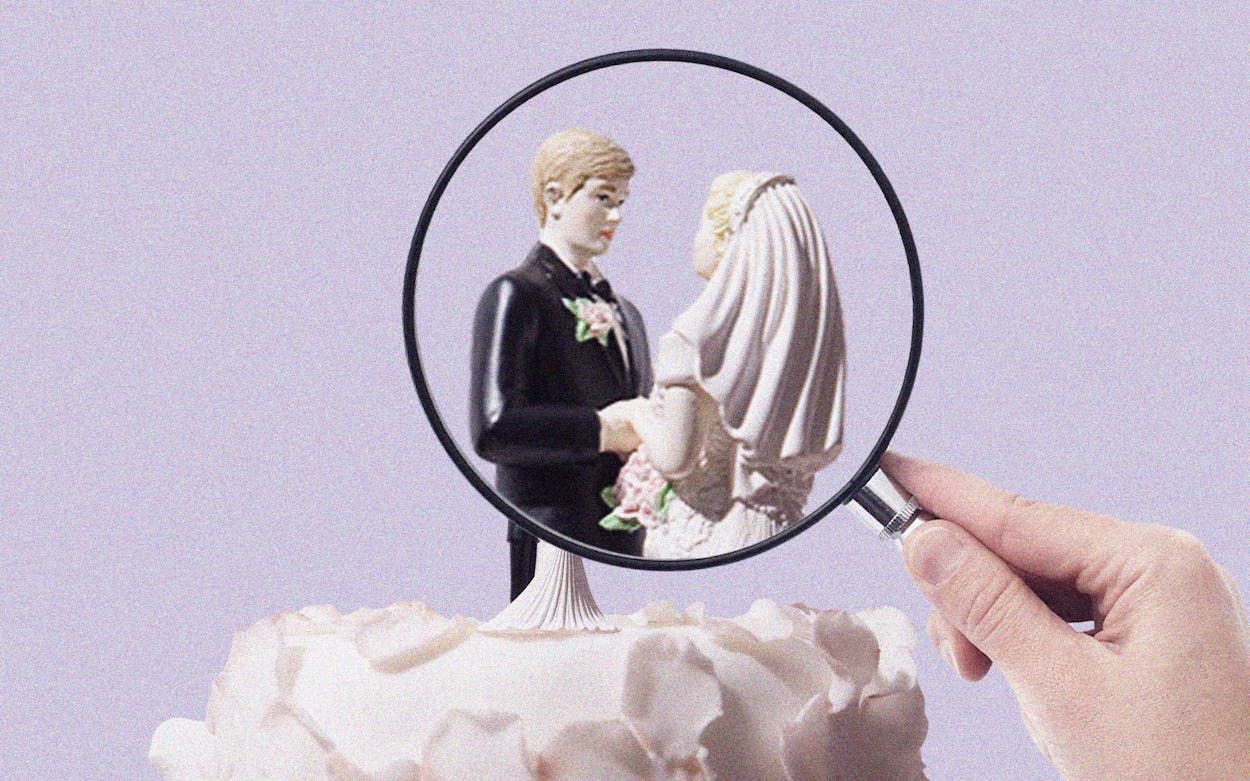It was a pandemic love story. After COVID-19 shut down New York City in the spring of 2020, Lacy Lynch gave up her apartment there and moved back to her hometown of Dallas to hunker down with family. The literary agent, who reps celebrities such as Jessica Simpson and Keke Palmer, was single, but soon after her return, she reconnected via text with her middle-school crush, Martin Gaines. He was the first boy she’d held hands with—while watching the movie Titanic.
The two were cautious during the pandemic. They corresponded via text and went on a handful of low-key outings before getting serious in early 2021, after a date at Rosewood Mansion on Turtle Creek on the same day that Gaines, a student in Southern Methodist University’s JD/MBA program, received the COVID vaccination. The reconnection was so electric that they became engaged within months. But instead of the huge wedding with hundreds of guests that Lynch, a self-proclaimed extrovert with many friends and connections, had always assumed she would have, they capped the guest list at nineteen people. And they planned the wedding—held at Rosewood—in just ten days.
The couple never expected to ask their family members to serve as makeshift vendors at the June 3 celebration, which was held not at the upscale hotel’s grand ballroom, but in the intimate Library room. Lynch’s mother acted as wedding planner, designed the table settings, and arranged the flowers and bouquets. Her brother-in-law officiated the ceremony, and her sister coordinated the music and speeches. The quickly planned wedding cost around $8,300, $1,200 of which was invested in Lynch’s strappy René Caovilla heels. Safety precautions certainly played a role in the couple’s decision, but they also say the pandemic helped them prioritize what was most important to them. “When we reconnected, it was just magnetic, and I knew very quickly she was the girl I wanted to marry,” Gaines says. “In this COVID world, there were so many different things that we took for granted, and so I was pushing for a quick wedding.”

During the first two years of the pandemic, a trend emerged among couples who didn’t want to defer their “I do”s but also wanted to be safe. Aptly referred to as microweddings—or, more adorably, minimonies—smaller, much more intimate ceremonies became an attractive option, especially during an uncertain time of infection peaks and valleys and surges of variants, including delta and, currently, omicron. (Of course, during that time, many couples also ignored health warnings and went forward with grandiose, Steel Magnolias–style weddings void of masks and social distancing).
Now, though, as the latest wave of infections seems to have peaked into our third year of pandemic uncertainty, engaged couples—including those joining the ranks of the betrothed this Valentine’s Day—have some big decisions to make. This year, in fact, is expected to be the busiest wedding year since 1984 in the U.S., according to market research firm the Wedding Report. As the industry rebounds, microweddings—or at least elements of them—are sure to continue for the time being. Supply-chain and staffing issues, travel unpredictability, and rising costs of, well, almost everything might force some couples to think smaller out of necessity. But others might lean toward more intimate events simply because they want to.
Houston wedding planner Erin McGlasson, the owner of Erin Elizabeth Custom Events, says couples are continuing to the pare down their guest lists, forgoing the inclusion of cordial coworkers and distant, haven’t-seen-them-in-years relatives. She believes this is not only out of a desire to protect vulnerable, at-risk guests, but also because the pandemic has altered people’s priorities and desires.
“People are now willing to make concessions so that the important people like grandparents can come and feel comfortable at their weddings,” says McGlasson, who managed almost forty nuptials last year, many of them outdoor events. “And I think with everything we’ve been through in the last two years, a lot of people have realized the trivial stuff is just not important anymore. Sometimes people invite guests just because they’re afraid they’ll get their feelings hurt if they’re not included, but people are shifting away from inviting every single person they know now. They’re more focused on including loved ones and those that are really important to their lives.”
When the pandemic first began, microweddings were the only option for couples who wanted to proceed with getting hitched. Austin’s Holly McVeety-Mill and AJ Gerstenhaber were among the first wave of Texas couples to decide to move forward with their COVID-era ceremony. A full-time wedding photographer, McVeety-Mill was looking forward to her own big day when she picked up her wedding dress in March 2020. Hours later, she found out that her Fredericksburg ceremony, scheduled for May 16, would have to be canceled because of the government-ordered shutdown. But after a two-year engagement and nine years of dating, the couple, who are both now 27, couldn’t wait anymore. Even if that meant holding an impromptu wedding on the roof of a parking garage.
“We were just ready to do it, so we decided we were going to get legally married no matter what,” McVeety-Mill recalls. “I can’t remember how I got the idea of a parking garage in my mind, but we drove around to a couple and decided on the one at the Long Center.” On May 16, she and Gerstenhaber, who works in tech sales, drove up to the fourth floor of the Austin performance venue’s parking garage and set up a sunset wedding with seven family members and their corgi present. The bride wore a $40 pastel dress and glitter Keds. Her husband sported a cream linen blazer with vintage tassel loafers. The group feasted on enchiladas verdes from El Chile Café y Cantina and gluten-free chocolate cake. When the celebration was over, the guests found themselves locked in after hours, forced to hunt down a parking attendant to let them out.
Also in Austin that spring, Bri Houk and Lindsey Leaverton decided to move their long-planned nuptials, originally scheduled for the historic Hotel Ella, to a much different venue: Doc’s Drive In Theatre in Buda. Guests arrived—and stayed—in their cars to watch not only the ceremony but also a showing of Airplane. “One of the most beautiful moments was when I saw my parents on the front row in their car, and I just broke down,” Leaverton recalls. “They had a really hard time when I came out, and I never imagined they would attend my lesbian wedding.”
The trend continued into last year, especially as the delta variant upset hopes that the worst was over after vaccines had become available. For their May nuptials, El Paso–based health-care administrator Marc Ponce and second-grade teacher Larissa Lopez decided their guests’ well-being was more important than throwing a big soiree. “We wanted people to feel safe and be safe,” says Ponce.
Both divorced single parents, they originally met at their children’s day care before finding each other on the dating app Bumble. They and their three children welcomed nineteen guests at Sombra Antigua Vineyard and Winery in Anthony, New Mexico, just over twenty miles northwest of El Paso. Ponce, who is 38, and 35-year-old Lopez each had around two hundred attendees at their previous weddings. Both found those larger events to be less personable than their tiny vineyard ceremony.
“Instead of spending the day walking around, shaking hands, putting on the show, we got to hang out with the people who have been with us the entire journey of our relationship and just let loose,” Ponce says. Larissa appreciated that the wedding was also a reflection of their everyday lives. “Going to a winery is a thing Marc and I like to do,” she notes. The wedding “was very much us and our relationship.”
For another couple, Dallas’s Ashley Gordon and Terrence Lomeka, elopement initially seemed like the only safe choice. They got engaged in the fall of 2020 after Lomeka recovered from a rough, two-month bout of COVID-19. Initially, they decided to elope alone in Las Vegas—a far cry from the Lake Como, Italy, wedding that Ashley had dreamed of for years. “I didn’t want my wedding day to take out a family member and it be synonymous with the time I killed off my mom,” she says. But after being persuaded by close family and friends, they invited eight vaccinated guests to their small destination wedding last April.
The bride and groom—both dressed in white—drove a classic Cadillac convertible to a dry lake bed thirty minutes outside of Vegas for a fifteen-minute ceremony, which ended with the guests popping champagne and feasting on sprinkled, jelly-filled doughnuts before heading to a diner, where the new couple celebrated with a colossal sundae.
Despite being in the midst of so much loss and uncertainty, Texans have still moved forward with life and all its milestones, even if they’ve had to do so in a limited capacity. Leaverton says she and Houk are proud they could be one of the couples to demonstrate how love can overcome hardship: “Even though we were in the most disconnected time that I can remember in history, we were all so connected by love,” she says. “To be able to be this tiny beacon of light in the darkness that connects us all—that is really powerful and profound.”
For anyone considering a microwedding, Ashley Lomeka advises them not to look at the decision as settling for something less. “Just because it’s a microwedding doesn’t mean it’s not a wedding,” she says. “I think when people think of microweddings they think they’re missing something, but just because the attendance is small doesn’t mean the sentiment is small or the vision is small.”
- More About:
- Style & Design
- Pandemic






